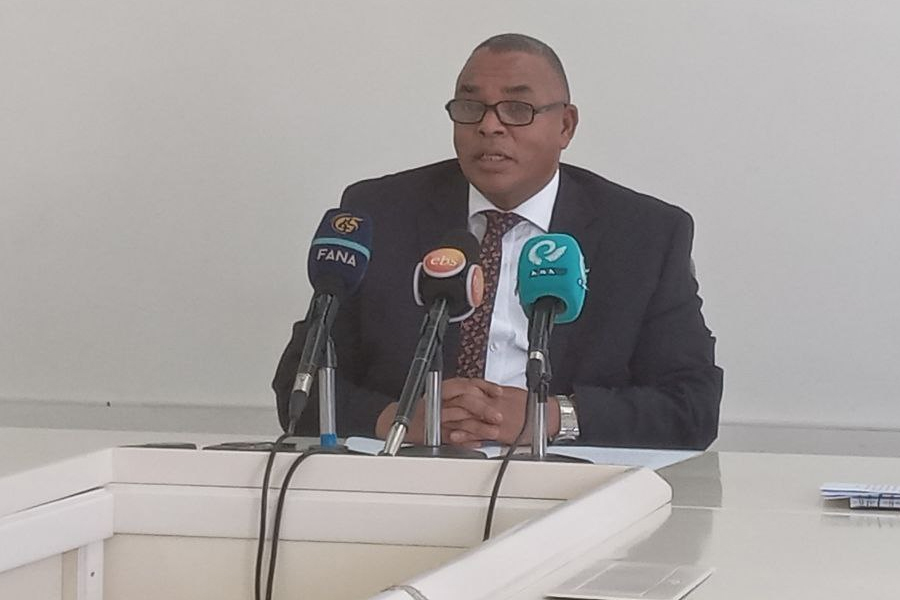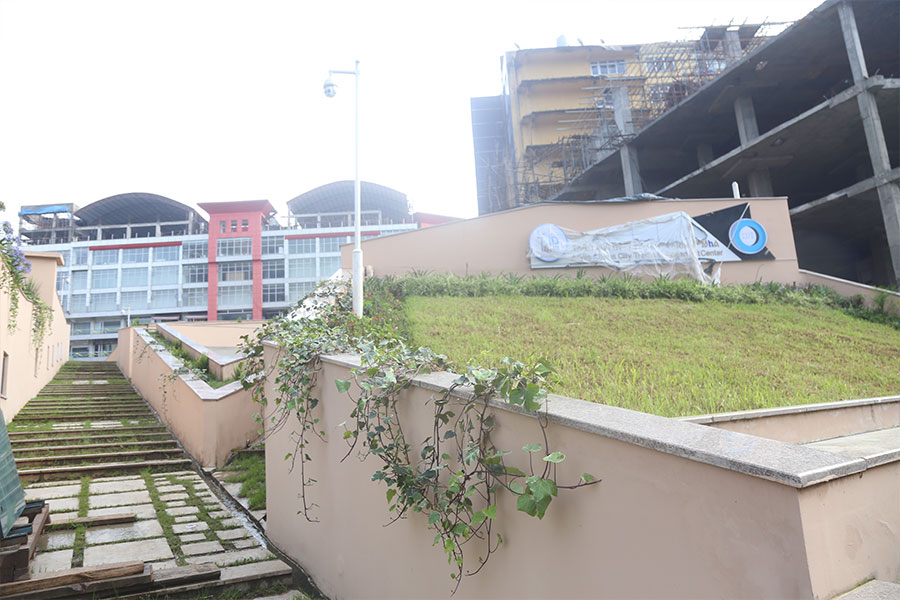
Radar | Nov 11,2023
It was a quiet, bitterly cold morning atop Entoto, the tallest mountain in the capital and namesake of the recently opened Entoto Park. The bone-piercing chill and the crisp mountain air will perhaps be familiar to the thousands that have visited the Park since it opened its doors at the beginning of last year.
Literature asserts that this very cold was a prominent factor behind establishing the city of Addis Abeba almost a century and a half ago. The frigid conditions, however, are and have been an everyday reality for the group of women in uniform who were seen cleaning and collecting trash near the Park's outer fence that morning.
These women used to make their living collecting firewood in the forests that surround Entoto. Still, they left behind their wood-carrying days when they were recruited for work in the Park as part of a highly publicised project conceived by the Office of the Prime Minister. With the commencement of the project, collecting firewood from Entoto was disallowed, and the women instead transitioned to making their living through working at the Park.
Though the transitional project was much touted in the media and the women themselves received it with the utmost gratefulness and expectation, the reality has been somewhat of a letdown. Many of these women are currently struggling to make ends meet.
At the Park entrance a little farther down from the group collecting trash, three women got off a bus and headed to their workstation, a small kiosk built for them by the Coca-Cola Company. One of these three women is Tadelech Bayu, a mother of four and a member of Amelewerk, Sitnatayeh & Co. Association, a union of workers in the Park.
Tadelech and her colleagues were almost an hour late to work. They explained in unison that it has become challenging to find buses on time. In fact, she usually travels on foot from her neighbourhood in Kechene, a little over seven kilometres away from the Park.
"My family raised me collecting firewood, and I followed in their footsteps," she said, recalling her not-so-distant past.
A single bundle of firewood made Tadelech and hundreds of women like her 60 Br.
"Strong women used to make a trip twice a day and earn 120 Br," she said.
Since the Park's opening in October 2020, the women have been receiving monthly pay of 1,000 Br, a sizable dip from what they used to earn. Tadelech struggles to make ends meet with her current earnings, but she is grateful that she has a husband who can do his part in providing for their family. She relayed that she worries the most about her elderly colleagues who have no other means of support.
Meskele Telefu and Zelekech Teshome, two elderly women, working in waste disposal and recycling at the Park, were gathering wood near the Park's fence barehanded, much like they used to do in their former days of collecting firewood. The rough working conditions they endured for years have taken a toll on their health. Meskele works with a broken left arm, an injury inflicted during the time she spent collecting firewood.
Although their work does not entail collecting wood, the women were gathering whatever was lying around to fill the garbage trucks that are only sent out to the waste collection site nearby if they are full. They understand that if the trucks are not sent out frequently, they will not get their monthly paychecks.
Kicking off the initial stages of the project, the Gulele District Women & Children Affairs Office was assigned by the city's Women & Children's Affairs Bureau to recruit women engaged in firewood collection, according to Almaz Alemayehu, team leader of women's participation & inclusion at the District Office.
Based on directions from the Office of the Prime Minister, the Bureau is in charge of overseeing the overall performance of the project.
In the first round, the Bureau recruited 263 women, prioritising women aged 14 to 29 following the findings of a study that showed that this age group is prone to unplanned pregnancies, leading to economic dependency.
A SEN'Q shop is operated by members of another newly formed association at Entoto Park.
One of the stakeholders in this project is PETCO, a non-governmental organisation established by 10 member companies engaged in bottled water and soft drink manufacturing. PETCO works to minimise the environmental effects of polyethene terephthalate (PET), a primary component of plastic bottles.
Following the establishment of Entoto Park, the organisation planned to place a proper solid waste management system at the Park. Four PETCO members financed the project — East Africa Bottling, One Bottled Water, Arki Bottled Water and Coba Impact Recycling — at 10 million Br to date.
PETCO invested in a recycling station at the Park where the workers Association can deposit and process the bottles they have collected and bought 10 electric vehicles to transport the bottles, according to Mihret Teklemariam, general manager of PETCO.
Moreover, with financial backing from East African Bottling, the NGO set up six small kiosks within the Park where the Association can sell soft drinks and bottled water to visitors.
East Africa Bottling invested a total of five million Birr, according to Nigus Alemu, legal counsel, public affairs & communications director at Coca-Cola Beverages Africa in Ethiopia.
Mihret explains that the Association has four separate income streams. Organic waste is sold to Reppie Waste-to-Energy Plant; recycled bottles are purchased by Coba Impact Recycling; 14 restaurants in the Park pay 500 Br monthly to have their waste collected; and revenue from water and soft drink sales make up the final mode of income.
However, all these investments were not received cheerfully by the women.
"What good is equipment to us when we want our daily bread?" asked Tadelech.
The not-for-profit organisation recognises the transition from collecting firewood to waste management is not a light one.
"They're put under immense pressure," says Mihret.
To make the process easier, PETCO provided training in machinery operation and driving and has hired project officers, sales and financial professionals, drivers, and a machine operator to help out.
The city's Women & Children's Affairs Bureau has identified that the number of women who made their living through collecting firewood is much greater than the ones already recruited, according to Hadas Kidu, director of the Bureau. She added that the Bureau is attempting to get the rest employed in different businesses.
Hadas shares the concern that women are not earning sufficient income. Understanding the dire conditions they might face, the Bureau provided food and sanitary products in early November. She also explained that the Bureau would discuss with PETCO to identify problems and possible remedies.
High expectations set before the commencement of work contributed immensely to the dissatisfaction of the women. Preliminary estimations conducted by PETCO showed monthly net earnings of 3,800 Br was to be expected.
Acknowledging that the current pay is indeed low, PETCO is looking into mechanisms to increase the Association's income. Now that the Association can issue VAT receipts, PETCO has brokered deals with the restaurants in the Park to buy bottled water and soft drinks from the Association.
"We are open to identifying more means of income," said Mihret.
Yordanos Gebretsadik, deputy general manager of the Association, agrees that the pay is low but says she is hopeful things will turn around soon.
"We can't change instantly; we have to make sacrifices to have a better life later on," she remarked. "They will earn more as the Park is fully operational," says Mihret, echoing Yordanos' optimism.
Regardless, she asserted that the women should not consider themselves employees, saying the more they work, the more they earn.
In the first two months, they earned around 260,000 Br, revealed Mihret.
With brewery BGI Ethiopia's support, a second batch of 200 women were recruited at the Park for a new association. The company related that it wanted to support women who lost their work collecting firewood when the Entoto Park project began.
"Because we can't identify beneficiaries, we collaborated with the City's Women & Children's Affairs Bureau," said Gebresilassie Sifer, communications & corporate social responsibility manager at BGI Ethiopia.
The company built three shops it named SEN'Q, after a new non-alcoholic drink brand, and one small store for the women to run.
In addition to setting up the shops, BGI supplied the first round of inventory, according to the manager. He added that the shops' sales revenue is dedicated to the women, on top of the 2,000 Br base salary being provided to them by the company.
Hadas explained that the process of having this group of women registered in an association was tedious, as most of the women had no prior experience in the formal economy. Despite having lived in Gulele District for decades, almost half of them did not hold identification cards, and a lot of them were unbanked.
Sorting that out took two months, much longer than the Bureau anticipated. The Bureau decided to dispatch them to duty before the formation of the association was finalised. The 176 women are engaged in cleaning the Park compound, while the remainder are in charge of sales at the shops set up by BGI.
Once the current investment bears fruit, BGI plans to recruit more beneficiaries from the Entoto area, according to Gebresilassie.
One of the members of the newly formed association is a mother of two working in one of the shops set up by BGI. For the past 11 years, she used to earn a decent living by selling souvenirs to tourists in the Entoto area, sometimes even making up to 1,000 Br a day. Although the shop's sales are good, none of the members has yet received their monthly salaries as promised.
"I'm living off my savings," she said.
She did not fail to mention that her current job is more predictable and much less exhausting.
Another association member engaged in cleaning services explains that it has been a difficult journey for her and her colleagues.
"Some have been evicted, because they couldn't pay rent," she explained.
After nearly four months of service, members were told they would receive a payment of 1,400 Br each after taxes late last week. In addition to their surprise about the amount of taxation, the women are worried about the remaining months' payments.
Hadas stressed that the delay did not occur due to negligence or failure to make the payment; instead, she points to the legal processes involved. She explained that four professionals were assigned to assist with the legal aspects in the hope of speeding up the process.
The general lack of awareness among the women about the legal process of forming an Association was a significant factor, according to Hadas.
"The association is obligated to pay taxes as per the country's laws," she said. "However, we're in a process to exempt the association from taxes for one or two years. Only one month's payment was issued, aiming to save them three months of taxation."
An expert in labour economics, who wishes to remain anonymous, explains that the transition from the informal to the formal economy needs both a general policy framework and a sector-specific framework behind it. The expert believes that this project lacks both of these.
Basic requirements should be fulfilled when implementing a project on economic transformation, and the recipients need to understand the opportunity they have been presented with, according to the expert.
"There is a big misunderstanding here," the expert added, suggesting that there be a discussion between the project managers and the beneficiaries to devise a plan that the women can understand well.
There are intrinsic economic benefits acquired from the formal economy such as legal protection, property and labour rights, but only if they understand them, according to the expert.
Beyond the legal recognition, on-the-job training and skill-building activities also have economic value. The primary intention of transitioning people into the formal economy is to break the cycle of generational poverty, added the expert.
"If the beneficiaries acquire new skills, there's a good chance that the generational curse will be broken," she said.
But this might not be immediately perceivable by the members, and the implementer's job should be ensuring that there is a structure in place to help them understand.
On paper, the transition into a formal economy is important and should be implemented all over the country, according to the expert, since the societal transformation that comes along with this is remarkable, but the beneficiaries are the ones that bear the immediate burden.
"We're a country in deep poverty," she explained. "Growing pains are inevitable."
"The association should have representation that resembles the majority of the members," she added, stressing that the livelihoods of working-class people are protected when there is a genuinely representative body.
PUBLISHED ON
Jan 23,2021 [ VOL
21 , NO
1082]

Radar | Nov 11,2023

Viewpoints | Apr 25,2020

Commentaries | Apr 30,2021

Featured | Sep 10,2023

Radar | Apr 26,2019

Radar | Jun 15,2019

Radar | Jan 18,2020

Fortune News | Aug 12,2023

Fortune News | Oct 09,2021

Radar | Sep 08,2024

Dec 22 , 2024 . By TIZITA SHEWAFERAW
Charged with transforming colossal state-owned enterprises into modern and competitiv...

Aug 18 , 2024 . By AKSAH ITALO
Although predictable Yonas Zerihun's job in the ride-hailing service is not immune to...

Jul 28 , 2024 . By TIZITA SHEWAFERAW
Unhabitual, perhaps too many, Samuel Gebreyohannes, 38, used to occasionally enjoy a couple of beers at breakfast. However, he recently swit...

Jul 13 , 2024 . By AKSAH ITALO
Investors who rely on tractors, trucks, and field vehicles for commuting, transporting commodities, and f...

Oct 25 , 2025
The regulatory machinery is on overdrive. In only two years, no fewer than 35 new pro...

Oct 18 , 2025
The political establishment, notably the ruling party and its top brass, has become p...

Oct 11 , 2025
Ladislas Farago, a roving Associated Press (AP) correspondent, arrived in Ethiopia in...

Oct 4 , 2025
Eyob Tekalegn (PhD) had been in the Governor's chair for only weeks when, on Septembe...